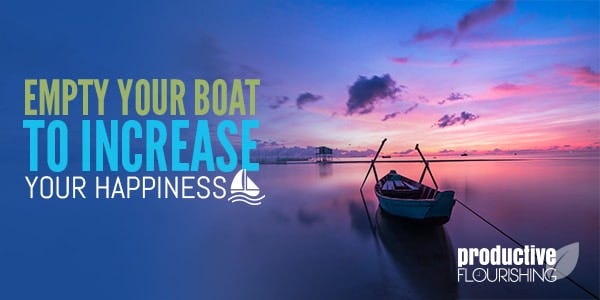Empty Your Boat to Increase Your Happiness
If a man is crossing a river And an empty boat collides with his own skiff, Even though he be a bad-tempered man He will not become angry. But if he sees a man in the boat, He will shout at him to steer clear. If the shout is not heard, he will shout again, And yet again, and begin cursing. And all because there is somebody in the boat. Yet if the boat were empty, He would not be shouting, and not angry. If you can empty your own boat Crossing the river of the world, No one will oppose you, No one will seek to harm you. - The Way of Chuang Tzu by Thomas Merton
I've read this passage from the Empty Boat for years, but a deeper understanding hit me last year.
The first reading and understanding of this passage is straightforward. Rather than assume that people are consciously driving their own boats — or worse, directing them at you — we can assume that people are being carried along the stream of life and doing the best they can.
Maybe they don't see you. Maybe the stream is too much for them. Maybe they're focused on not hitting someone or something else you can't see. Either way, rather than shouting at them or being mad that they hit you, the better ways to handle the situation is to either spend that energy moving out of their way or not being angry if you accidentally get bumped.
This is another way of understanding the second of the Four Agreements (Don't Take Things Personally), or, the way I sometimes say it, you're not the center of the universe.
It's the second verse that required more reflection and understanding. Emptying your own boat means letting go of attachments to outcomes; it's striving less in the world and being open to where the stream is taking you. As a driven strategist, this is a hard counter-practice to my natural tendencies to set up a bunch of dominos that fall the way I want them to. I will say that finding the balance between those things to let go of and those things to influence or orchestrate increases my general peace, happiness, and well-being.
The later insight I alluded to earlier was that the second verse was also about non-interference, which is one of the major tenets of Taoist philosophy. Non-interference, when it comes to people, means letting people be the agents of their own outcomes. It doesn't exclude actively removing obstacles that are interfering with people — to use our boat metaphor, offering to pull someone out of an eddy that's keeping them from flowing with the stream is just fine.
It's when you assume that someone in an eddy is stuck that you run into trouble. Maybe they're there because they want to be out of the stream for a while. Maybe they're there because something there has their positive attention. Either way, assuming they need to be pulled from the eddy because they're stuck doesn't address that people have different ways of being in the world. Offer without assumption, but move on if they choose to stay.
Actively overriding the impulse to interfere with others is hard to do, especially when dealing with people battling with illnesses, addictions, and obsessions that may themselves be interferences. Someone on the roof or at the bottom may need to be pulled from it or picked up out of it. Perhaps your action is less of an interference than whatever has them there. This relates to some ideas I shared in Two Concepts of Freedom, as well: sometimes the best way to advance positive freedom is contrary to the way you'd maximize negative freedom.
The level of non-interference this verse is advocating is deeper than standard non-interference because it addresses the intentions as much as the actions. To want and intend people to do certain things is to clearly not be an empty boat. Because there are clearly so many people interfering with each other, no one will "oppose" or "seek to harm you" because they're so busy yelling and contending with someone else. The stream rarely makes us bump into people with a lot of force, so accidental bumps don't cause lasting damage, and you have an option so many people don't: you can give a sincere apology because you have no ego attached to the action.
I was talking to Susan Piver last week and we were discussing Sartre's line, "hell is other people." (from No Exit. His often misunderstood point is that because our identity is largely — if not solely — determined by other people, our misery is often caused by or dependent on other people. But ... so is our happiness.) Perhaps hell is other people when you're interfering with them or assume they're interfering with you. I read Sartre nearly 14 years ago and have never really resonated with his work largely because my experience is more in line with Milton's from Paradise Lost: "The mind is its own place and in itself, can make a Heaven of Hell, a Hell of Heaven." We create what we experience.
The more you empty your own boat and see the joy and peace that's around you — especially the joy, beauty, and general amazingness of the people you're with — the less making of anything you have to do, which also means you have less of a chance making a hell of heaven. The challenge is being unattached to people being a certain way or doing certain things.
Yes, I realize that this seems to be at tension with planning and actively doing things in the world. As Lao Tzu said, "when opposites supplement each other, everything is harmonious." Our life's work is to create the harmony.
How can you empty your own boat today?



